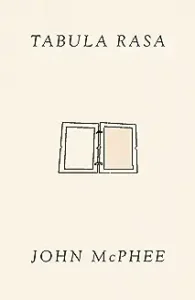Tabula Rasa by John McPhee 2023
I had been reading John McPhee’s long non-fiction in The New Yorker for many years when I decided to collect all of his books and read my way through this amazing writer’s entire ouevre. Having gathered all 32 of his books a few years ago, I began with his 1965 book ‘A Sense of Where You Are’, his brilliant essay about Bill Bradley who was an All-American basketball player at Princeton. Working my through the next several volumes, including two of my favorite works of non-fiction, the ‘Headmaster’ and ‘Coming into the Country’, I was distracted by McPhee’s continuing to publish new work and my enthusiasm for reading those books. This year brought ‘Tabula Rasa’, a ‘melange of memories’ which he describes as his ‘old man project’ in which the 92 year old Princetonian picks up threads of pieces he considered but never wrote and revisits them.
McPhee has a boundless curiosity, and in this book of short pieces from one to ten pages long, he collects and briefly explores ideas that interested him at one time but which he never followed up on. There is a strong flavor of Princeton in these works, both the town in New Jersey where he grew up and the eponymous university where his father, born in 1895, was the team physician for their athletic teams. Having lived there nearly his whole life and having raised his daughters there, the memories are rich, detailed, and often fascinating touching on Woodrow Wilson who coached football at Wesleyan before becoming president of Princeton and then the U.S., but whose name has been largely erased from the university because of his racist and anti-semitic leanings; Albert Einstein, Meredith Wilson of ‘The Music Man’ fame, Lewis Thomas who wrote an encouraging note to him, Peter Benchley, the author of ‘Jaws’, Thornton Wilder, Christian Menn a bridge designer who fashioned the Lenny Zakim bridge in Boston, and many other academics and townspeople whose names are not as widely known.
One of the joys in reading McPhee is his use of arcane and interesting words which send me to the dictionary (okay, to Google). Among them in this volume were triangle centers (of which there are now 37,887 in the mathematical world, from an essay on), polders (a unit of reclaimed farmland below sea level) and uncatadromous (fish who are hatched and spawn in the same body of water, from an essay on the delta islands of the Central Valley of California), ophthiolitic sequence (thinned oceanic crust indicating sea-floor spreading from an essay on writing about science), pallesthesia (the ability to perceive vibration in an essay on the Englishification of names), and on and on. McPhee introduces us to interesting people and fascinating topics, and inevitably we share McPhee’s confrontation with mortality as many of the essays conclude with the sentence “fill in the blank’ died in ‘fill in the year’. Tempus fugit.
One of the elements of McPhee’s writing that I love is his own love of the telling detail which he unearths in his deep dive into whatever topic he becomes fascinated by. For example, in his essay about the captain of the ship he boards in his book “Looking for a Ship” we learn that in 1988 there were roughly 23,600 merchant ships in the world. In another essay, we learn that the typeface used in The New Yorker is Rea Irvin. In another essay, we learn that Block Island is named for Adriaen Block, a Dutch captain whose ship sank in 1614 off Manhattan and who discovered the island when his new ship sailed for Europe. Insatiable curiosity, indeed.
When all is said and done, I love McPhee’s writing because of his curiosity which has taken me to wonderful and exotic places as well as enabling me to discover arcane details about mundane places and activities. Another element may be his Vermont connection. He learned to canoe and fish, major activities throughout his life and writing, at Camp Keewaydin on Lake Dunmore in Vermont, between Middlebury and Brandon, not far from where Robert Frost had his simple home in Ripton, VT. Whatever the reason, McPhee is terrific. I’m about halfway through his 32 books, and I look forward to reading the next half with eagerness. If he would just stop publishing new books, I might even be able to get this done!



